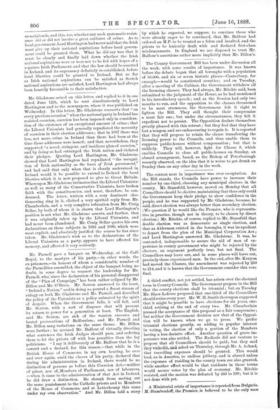Mr. Parnell gave a banquet on Wednesday, at the Cafe
Royal, to the martyrs of his party,—in other words, the ex-prisoners,--in honour of whom a considerable number of the Parnellites assembled, the object of the banquet being, no doubt, in some degree to reassert the leadership for Mr. Parnell, who,esince the declaration of his personal disapproval of the "Plan of Campaign," has been rather eclipsed by Mr. Dillon and Mr. O'Brien. Mr. Sexton answered to the toast, "Ireland a Nation," and in doing so, poured a fluent stream of eulogy on both Mr. Gladstone and Mr. Parnell, and described the policy of the Unionists as a policy animated by the spirit of despair. When the Government falls, it will fall, said Mr. Sexton, with a sort of disgrace that will prevent its return to power for a generation at least. The English, said Mr. Sexton, are sick of the wanton excesses and brutal provocations of Balfourism ; and Mr. Parnell and Mr. Dillon sang variations on the same theme. Mr. Dillon went further ; he accused Mr. Balfour of virtually directing what sentences the Irish Judges should pass, and ordering them to let the priests off with less penalties than the lay politicians. "I say it deliberately of Mr. Balfour that he is a coward and a dastard, for this reason,—that while in the British House of Commons, in ray own hearing, he over and over again, amid the cheers of his party, declared that during his administration in Ireland, there would be no distinction of persons as before this Coercion Act,—neither of priest, nor ofaMembers of Parliament, nor of labourers, —when it came to the administration of that Act in Ireland, he did draw a distinction. He shrank from meting out the same punishment to the Catholic priests and to Members of the House of Commons, and at Letterkenny this came under my own observation." And Mr. Dillon told a story
by which he expected, we suppose, to convince those who were already eager to be convinced, that Mr. Balfour had ordered an M.P. to be treated as a felon and insulted, and the Priests to be leniently dealt with and declared first-class misdemeanants. In England we are disposed to trust Mr. Balfour's assertions rather more implicitly than Mr. Dillon's.


































 Previous page
Previous page